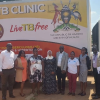- Butabika Road , Kampala, Uganda
- [email protected]
NHLDS UNITS
The laboratory client has over the years become more aware of their right to health including laboratory services. The Ministry of Health has the Client Charter (2013) that operationalizes the education of patients on their right to health and services expectations. Despite the availability of this policy framework, there is inadequate health promotion on the role and use of laboratory services and community rights to appropriate laboratory diagnostic testing.
The laboratory client has over the years become more aware of their right to health including laboratory services. The Ministry of Health has the Client Charter (2013) that operationalizes the education of patients on their right to health and services expectations. Despite the availability of this policy framework, there is inadequate health promotion on the role and use of laboratory services and community rights to appropriate laboratory diagnostic
The National Health Laboratory Services sets to make laboratory services an integral part of the health services responsiveness to the community needs and is adhering to ethical standards, Laboratory staff is handling clients with respect and is safeguarding client confidentiality and privacy. Communities are always informed about their rights to appropriate diagnostic testing and about their roles and usage of laboratory services.
Uganda is a resource-limited country where the majorities of the people (over 60%) are living in rural or difficultly access areas and are out of reach of the existing formal structures of the national health care systems, particularly laboratory services. Laboratory services are existing at national, regional, district, health-sub district and sub-county levels and capacity at community level is largely lacking. This top-down structure fails to reach the very people who stand to benefit most from it. There is, therefore, a recognized gap between the availability of laboratory services and the majority of the people who should be beneficiaries.
The “Community Laboratory Initiative” (CLI) is a good strategy to mitigate the gap in community access to laboratory services. This approach is recognizing a model of an integrated package of “Rapid Diagnostic Tests”(RDT) aiming at the key health targets – reducing of infant and maternal mortality in remote rural communities; the challenges posed by malaria, HIV/AIDS, TB, diarrheal diseases, respiratory infections, nutritional deficiencies, neglected tropical diseases and other local relevant public health threats.
The UNHLS is implementing this bottom-up, people-centered approach which is eliminating the current gap in access to laboratory services and creating coherence across the whole platform of diagnostic technologies from the sophisticated reference laboratory to the rapid diagnostic tests carried out by the primary health care workers in their communities.
By Mr.Guma Gaspard
Health Laboratory Technical Advisor
This unit strives to operationalize the National Procurement and Supply Management plan aimed at strengthening the laboratory supply chain system involving warehousing, distribution, and storage of laboratory logistics and supplies.
This is all intended to minimize supplies stock outs countrywide, having adequate supplies and functional equipment to support uninterrupted delivery of the UNMHCP. The unit also strives to have accurate national quantification for reagents, supplies and commodities used to determine forecasts for the credit line at NMS and JMS where each facility is allocated a sum of money from which they draw an equivalent of supplies.
M&E systems require a combination of routine (monitoring) and periodic (evaluation) documentation, analysis, reporting and visualization of results.Documentation, analysis, reporting and visualization of results is guided by prior agreed Key performance Indicators (KPIs) – that are extracted from the National Strategic Plan (UNHLS). KPIs – identified through an approach that is chosen by either the – institution/organization or the expert/consultant. Opting to use AverdisDonabedian – Systems wide Approach. Each of the 13 strategic units and its operational sub units making up UNHLS (including M&E) should develop, adopt and share their set KPIS as stipulated in the NSP (example in Table 1.0 below) that will measure their performance as a contribution to the overall performance of UNHLS.
UNHLS Management should Identify/nominate M&E Focal Points/persons for each unit/sub unit( if necessary), provide the tools, Scope of Work and Terms of Reference, then M&E Technical Support will coordinate these resources into a Robust M&E system for UNHLS
Strategic M&E Direction-UNHLS 2017
- National Lab Services
How many Labs do meet the established Test menu-Hub versus All Laboratory across the country(Bazeeyo, Kiwanuka Report Dec 2016 on Lab services in Uganda is alluding to dichotomy in Lab performance)
- Central M&E Focus
Test Volumes :How many Lab tests do all labs in Uganda do? (When disaggregated by technique/test type this informs logistics, QA, Management and SMC for planning, policy and management purposes)
For volumes, follow the links below
-EID
Reporting Rates: -KPI for UNHLS, DHI and SMC to monitor performance
- How many Hubs submit complete reports on –Monthly, Quarterly, Annual
- How many Labs submit complete HMIS 105 reports on Monthly, Quarterly, Annual basis
This unit strives to strengthen Biosafety and Biosecurity practices through relevant committees at all levels; that develop, review, update, disseminate and enforce compliance to Biosafety and Biosecurity standards and guidelines including infrastructure.It strives to maintain an inventory of all chemicals, infectious agents and other harmful materials that have potential for malicious use and regulate their storage and access. Appropriate space to conduct laboratory business and a safe environment for health personnel, clients and the community is paramount in providing laboratory services for all.
This unit serves to have an adequate number of skilled staff with the necessary competency and motivation to deliver quality laboratory services at all designated levels by recruiting, deploying and retaining staff. The unit also strives to achieve and implement pre-service and in-service training needs and requirements of laboratory personnel. Uganda requires the availability of carefully planned, effectively trained, equitably distributed and optimally utilized health workers at all levels of the laboratory network.
The CPHL liases with the Allied Health Professionals Council (AHPC) to regulate health laboratory service provision in both the public and private sector. In this aspect, CPHL plays a critical role through production of standards and guidelines.
Strategic Milestones
Since 2000, after getting laboratory sector stewardship CPHL has registered great strategic strides and notably;
Development of National Healthy Laboratory Policy (2009) that highlights strategic laboratory service areas through dedicated guidelines and improved coordination of the sector
Developed a National Health Laboratory strategic Plan 2010/11-15 that helps implementation of the policy
Development of numerous guidelines, manuals and Standard Operating Procedures in different laboratory areas that have helped improve quality of service
Increased adovacy of the laboratory sector strengthening by involvement of Members of Parliament, Ministry of Health Top officials, Health Development Partners Bosses, and use of Regional Hospital Directors to coordinate Regional Laboratory sector improvement
Construction of CPHL permanent premise at Butabika through a heartly support from USG
The CPHL has strengthened management of laboratory services by setting up managers at various levels of service delivery, by putting in place Regional Laboratory Quality Committes and District Laboratory Focal Person to support the laboratory in-charges at facility levels as well as the Central/National coordination office
This unit strives to streamline the laboratory organizational structure under one clear leadership of the National Health Laboratory Technical and Advisory Committee that will raise the profile of laboratory services and establish linkages among public and between public and private health sector laboratories.Laboratory services in Uganda require one clear management structure at all levels including district levels, for management, coordination, and supervision.
This unit strives to strives to coordinate mechanisms with other Ministries, Implementing and Developing partners to improve the organization, financing, management, and delivery of quality laboratory services. It also undertakes to out-source specific laboratory services especially in under-served areas in order to increase efficiency by networking between public and private laboratories.
The unit also coordinates activities of the Allied Health professionals Council in the districts to enforce licensing, registration and control of all health laboratory services. Health Laboratory services related public-private partnership need to be promoted and encouraged as a way to achieve improved services delivery.
Patners:
This unit strives to develop and implement a national research agenda for laboratory services to improve patient management, laboratory performance and disease control. The unit identifies priority areas for research, and liaises with Uganda National Council of Science and Technology to approve research activities in health laboratory services.
The unit also coordinates mechanisms for dissemination of research findings. Uganda needs to have comprehensive and coordinated mechanisms for conducting operational research geared at improving laboratory service delivery.
The CPHL-Regulatory and Legal Framework department is providing a legal framework ensuring safe, quality laboratory operations and protecting the people from sub-standard and unethical laboratory practices. A national regulatory framework always establishes requirements for registration and licensing of laboratory facilities and the laboratory workforce. Registration is the official recognition that laboratories and laboratory workers have complied with the legal requirements to operate within a country. Licensure is the documented permission from the regulatory authority to carry out specific laboratory functions within a designated time period.
Laboratory services in Uganda are regulated under the Allied Health Professionals Act, of 1996. The Act mandates the Allied Health Professionals Council to register all laboratory professionals before they can practice. The council is also mandated under the same Act to register and license all laboratories, public, private as well as private not for profit. Pathologists who are medical doctors now practicing laboratory services are registered and licensed under the Medical Practitioner and Dental surgeon Act. The rest of the caders (Lab Assistants, Lab Technicians, Scientists and MLT’S) are registered under the Allied Registration Act
During the implementation of the current National Laboratory Strategic Plan for the Allied Health Professional Council is supporting to strengthen its capacity to register and license laboratories and their work force as well as monitor their operations. The council is able to hire a laboratory Quality Officer who is the liaison officer between the council and CPHL .It has also been able to expand its operations beyond the headquarters by establishing regional offices in several health regions. The Regional offices are utilizing the District Laboratory Focal Persons (DLFPs) to monitor laboratories.
As the CPHL transforms into the Uganda National Health Laboratory Services (UNHLS), a Bill has been drafted and is passing through the process of being enacted into an Act of Parliament. When passed, this Act is establishing UNHLS as an autonomous body undertaking and co-ordinating health laboratory services in Uganda; providing the purpose and functions of the Organization; a Board of Directors and its functions; its finances; legal rights and obligations and providing for connected matters.
The National Drug Authority (NDA) plays a role in regulating laboratory supplies, equipment and diagnostic devices is having its law reviewed. This affords an opportunity for it to be appropriately strengthened as currently its capacity to regulate laboratory commodities is weak. Supporting in terms of technical assistance and advocating will therefore be offering to influence the establishing of appropriate capacity at NDA regulating laboratory commodities and establishing working links with CPHL/UNHLS.
By Mr. Guma Gaspard
Health Laboratory Technical Advisor
Contact info
We are the leaders in the building industries and factories. We're word wide. We never give up on the challenges.
- 2 Queen Street,California, USA
- (+84) 04 123 456
- [email protected]



